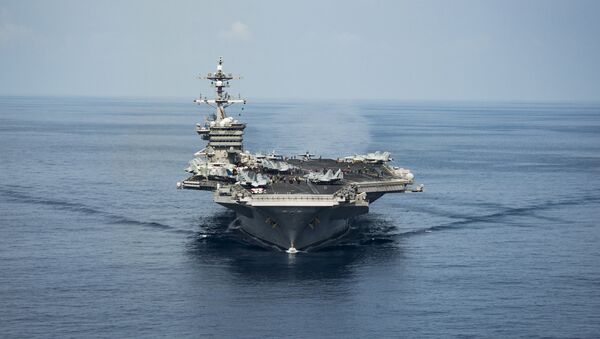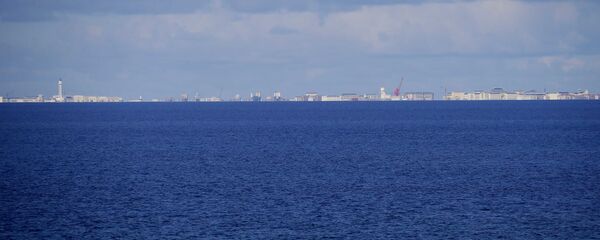Sputnik delved into whether the commander’s statement meant a softening of the US position on the issue of the South China Sea, which regularly sends warships to the region under the pretext of ensuring freedom of navigation.
READ MORE: US Army Hints at 1,000-Mile Range Supergun That Could Be Used in South China Sea
Admiral Richardson touched on the issue of the South China Sea during a speech at the Brookings Institution in Washington. According to the admiral, the goal of the ongoing dialogue with Beijing is to avoid clashes at sea.
The mechanism of constant communication between the Chinese and American military is necessary in order to de-escalate a possible conflict in time before it enters a hot phase. The admiral also said that he maintains a "good working relationship" with the Chinese military, commending his latest visit to China in mid-January. Meanwhile, the commander did not try to convince the participants that a rapprochement between the positions of the two parties on the challenges in the South China Sea had occurred. According to Richardson, in his assessments and understanding of the situation, the parties' positions are "just at odds right now".
According to Chinese expert Shen Shishun, director of the Centre for South Pacific Studies at the China Institute of International Affairs, the American formulation of the question of "freedom of navigation" raises doubts.
"The slogan ‘freedom of navigation' is not justified in itself. In the South China Sea and the Taiwan Strait, there has never been a problem with freedom of navigation; there is no evidence that navigation in these areas is not free. If there are no problems here, it is obvious that the issue of navigation is used only as a pretext for interfering in internal affairs. Any act of interference in the internal affairs of China under the pretext of the so-called freedom of navigation in the Taiwan Strait and the South China Sea is inappropriate. The United States must understand this. Chinese sovereignty extends to both the South China Sea and the Taiwan Strait. The issue of the Taiwan Strait is a matter of relations between mainland China and the island: its solution does not require the participation of any external forces. In any case, it is unwise to interfere in the affairs of the South China Sea and the Taiwan Strait".
However, in an interview with Sputnik, Shen Shishun praised the efforts of China and the United States to establish a confidence-building mechanism in the South China Sea. He also called the practice of joint Chinese-American exercises useful.
READ MORE: China Deploys 'Ship-Killer' Missiles in Wake of US Ship's South China Sea Tour
"The joint exercises of the two countries at least give them the practice of properly understanding the signals to each other in the event of friction and conflict. This will help reduce cases of misinterpretation of each other's behaviour and will play a certain positive role", Shen Shishun noted.
From the statements of the Chinese expert, it is clear that the Chinese side is also concerned about the security issue. However, China sees the solution not in demonstrating force that will make others play according to arbitrary rules, but in observing international law.
"In activities in any region of the world, no matter [whether it's] at sea, in the air or on land, we should respect the UN Charter and act in accordance with international laws and rules, this is not a case when a single state has to make a decision", Shen Shishun told Sputnik.
The views and opinions expressed by the speaker do not necessarily reflect those of Sputnik.


